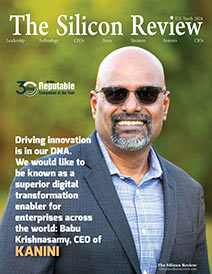CEO REVIEW: Making a bookstore turn into one of the internet’s biggest success stories : Jeff Bezos, CEO-Amazon.com
The Silicon Review
![]()
“There are two ways to extend a business. Take inventory of what you’re good at and extend out from your skills. Or determine what your customers need and work backward, even if it requires learning new skills. Kindle is an example of working backward.”
Mr Jeffrey Preston popularly known as Jeff Bezos is a technology entrepreneur who has played a key role in the growth of e-commerce as the founder and CEO of Amazon.com. A graduate from Princeton University, he worked on Wall Street, Fitel, Bankers Trust and D. E. Shaw & Co. in his initial years and founded Amazon after a United States Supreme Court ruling in Quill Corp. v. North Dakota. In this case, Quill Corporation, an office supply retailer had no physical presence in North Dakota but had a licensed computer software program that some of its North Dakota customers used for checking its current inventories and placing orders directly and the North Dakota attempted to impose a use tax on Quill, which was struck down by the Supreme Court which ruled that a business must have a physical presence in a state for that state to require it to collect sales taxes. However, the court explicitly stated that Congress can overrule the decision through legislation and in 2011; a bill overruling the decision was indeed introduced in the Parliament, ultimately taking the shape of the Marketplace Fairness Act which was passed in 2013 and is still under consideration by the House Committee on the Judiciary.
Mr Jeff learnt about the decision and a sudden thought about the technology boom at the same time, made him head towards Washington (to set up Amazon in 1994), whose small population would mean fewer sales tax would be paid by the future customers. He initially set up his office in his garage where, along with a few employees, he began developing software, gradually expanded operations into a two-bedroom house and eventually developed a test site, on whose successful testing, he opened Amazon.com, named after the meandering South American River in 1995.
Mr Jeff always believed that “What is needed to do is always lean into the future; when the world changes around you and when it changes against you – what used to be a tail wind is now a head wind – you have to lean into that and figure out what to do because complaining isn’t a strategy” and the result was, Amazon.com went public in 1997. Although many market analysts questioned whether the company could survive in the market when the traditional retailers launched their own e-commerce sites, the start-up unexpectedly not only survived even after two years of functioning, but also outdid its competitors and become an e-commerce leader.
Building best tablets at any price In 2007, Amazon.com released the Kindle, a handheld digital book reader. In 2011, the company unveiled the Kindle Fire and within the next few months, announced the new Kindle Fire HD, the company’s next generation tablet designed to give Apple’s iPad a run for its money.
Venturing beyond Amazon.com
In 2011, Mr Jeff announced his investment in Blue Origin, The success of Amazon allowed Bezos to explore his lifelong interest in space travel and in 2004, he founded an aerospace company, Blue Origin, a Seattle-based aerospace company that is developing technologies to offer space travel to paying customers, with the ultimate goal of establishing an enduring human presence beyond the Earth.
In 2013, he made a personal purchase of The Washington Post for $250 million in cash for experimentation purposes and has kept everyone waiting ever since, watching out for what he does out of this take over.
Based on market cap, the online retailer continues to be the second-largest e-commerce company in the world and continues to strengthen its position globally under the able guidance of the acclaimed CEO.
With a belief in “What we need to do is always lean into the future; when the world changes around you and when it changes against you – what used to be a tail wind is now a head wind – you have to lean into that and figure out what to do because complaining isn’t a strategy”, Mr Jeff is a true reflection of the fact that “There will always be serendipity involved in discovery.”
“We’ve had three big ideas at Amazon that we’ve stuck with for 18 years, and they’re the reason we’re successful: Put the customer first. Invent. And be patient.” “Amazon.com strives to be the e-commerce destination where consumers can find and discover anything they want to buy online.” “There are two kinds of companies, those that work to try to charge more and those that work to charge less. Amazon.com will be the second.” “There are two ways to extend a business. Take inventory of what you’re good at and extend out from your skills. Or determine what your customers need and work backward, even if it requires learning new skills. Kindle is an example of working backward.”









